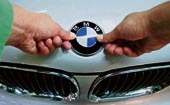BMW's Dream Factory Oct 7, 11:49
 Talk about nice ink! An excerpt from a story filed under "innovation" in the 16 October issue of BusinessWeek magazine, with the subhead, "Sharing the wealth, listening to even the lowest-ranking workers, and rewarding risk have paid off big time."
Talk about nice ink! An excerpt from a story filed under "innovation" in the 16 October issue of BusinessWeek magazine, with the subhead, "Sharing the wealth, listening to even the lowest-ranking workers, and rewarding risk have paid off big time." Although BMW, with $59.2 billion in sales last year, is much smaller than its American rivals, the U.S. auto giants could still learn a thing or two from the Bavarians. Detroit's rigid and bloated bureaucracies are slow to respond to competitive threats and market trends, while BMW's management structure is flat, flexible, entrepreneurial -- and fast. That explains why, at the very moment GM and Ford appear to be in free fall, BMW is more robust than ever. The company has become the industry benchmark for high-performance premium cars, customized production, and savvy brand management, making it the envy of Mercedes-Benz (DCX ), Audi, and Lexus and the subject of Harvard Business School case studies. Even mighty Toyota Motor Corp. (TM ) regularly dispatches engineers to BMW's factories to see how the company cranks out 1.3 million customized cars a year.
Few companies have been as consistent at producing an ever-changing product line, with near-flawless quality, that consumers crave. BMW has redefined luxury design with its 7 Series, created a mania for its Mini, and maintained some of the widest margins in the industry. A sporty four-wheel-drive coupe and a svelte minivan called the Luxury Sport Cruiser are slated to roll off the production line in 2008. Those models promise to continue BMW's run of cool cars under its new chief executive, Norbert Reithofer, who took over in September. (His predecessor, Helmut Panke, stepped down upon reaching the mandatory retirement age of 60.) Says Reithofer: "We push change through the organization to ensure its strength. There are always better solutions."
Full story

Know Your Partners | by TFE